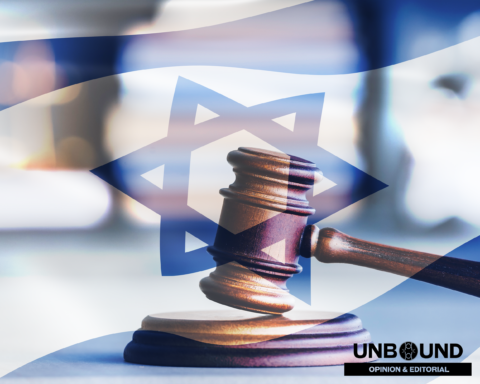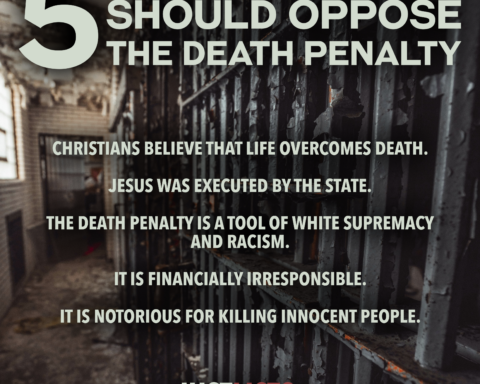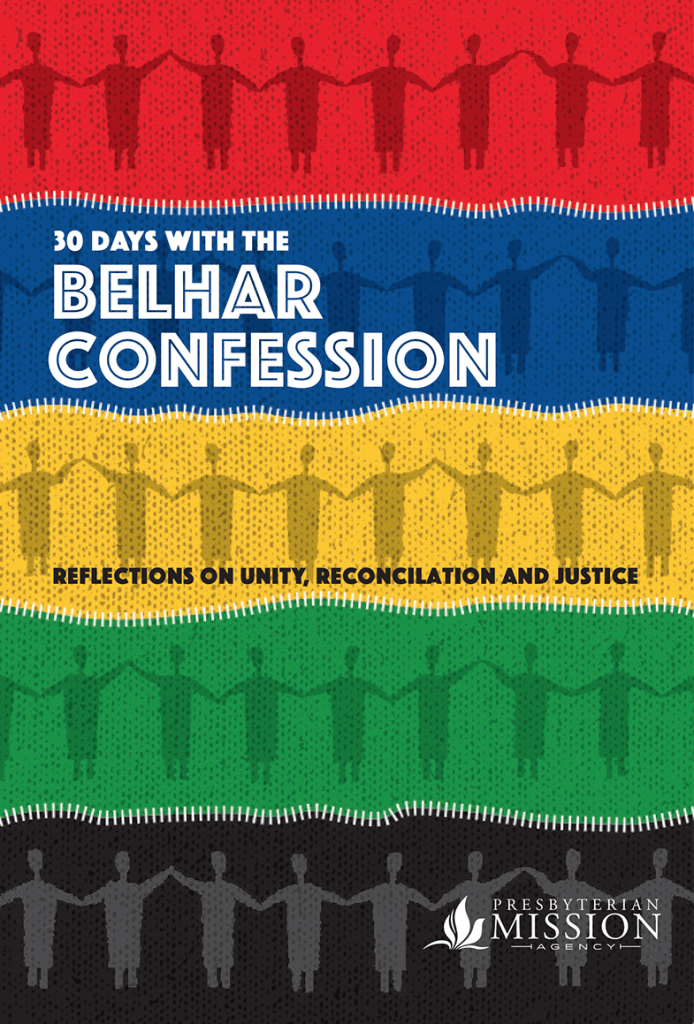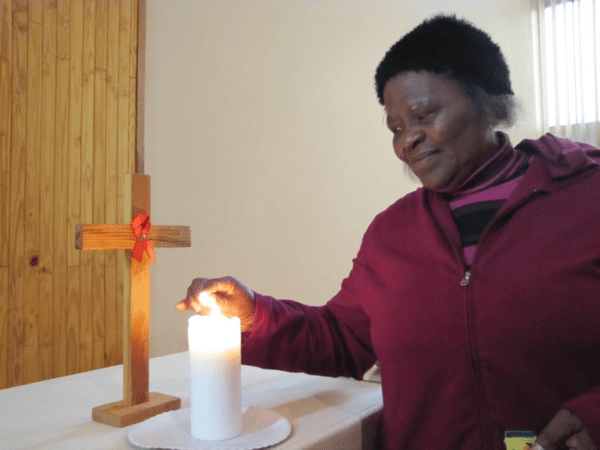Palestinian Children and Israeli Military Detention

“A voice was heard in Ramah, wailing and loud lamentation, Rachel weeping for her children; she refused to be consoled, because they are no more.” –Matthew 2:18
Presbyterians affirm that the Holy Spirit gives us courage “to hear the voices of peoples long silenced.”
In the occupied West Bank of Palestine, there are many voices that we need to hear. Among them are voices that do not belong to the leaders or elites. They are young, shackled, and locked up behind bars. They are the voices of invisible children who will influence and shape the future of the region. Children’s voices are among those most frequently and fully silenced.
Today, children represent nearly 50 percent of Palestinians living in the occupied West Bank, including East Jerusalem, and the Gaza Strip. Instability and violence define much of their lives. Instead of growing up with a law-based, negotiated settlement founded on universal human rights principles, justice, and respect for human dignity, Palestinian youth have had their futures stifled and suppressed by systemic discrimination, constant settlement expansion, and prolonged military occupation.
___________________________________________
Israel signed the UN Convention on the Rights of the Child in 1991…yet Israeli legislation and military and police practices routinely contravene international law.
___________________________________________
Since 1967, Palestinian children in the Occupied Palestinian Territory have been living under Israeli military law and prosecuted in military courts. Each year, an estimated 500 to 700 Palestinian children living in the occupied West Bank are arrested by Israeli forces and prosecuted in an Israeli military detention system notorious for the systematic and widespread ill treatment and torture of Palestinian children. The majority of Palestinian child detainees are charged with throwing stones.
The situation on the ground is rapidly deteriorating, and we must act now. At the end of February, there were a total of 440 Palestinian children in Israeli military prisons. This is the highest number since data became available from Israel Prison Service in 2008.

A report released in April by Defense for Children International-Palestine, based on the testimony of 429 Palestinian children detained by Israeli forces, found that three-quarters endured some form of physical violence following arrest. Israeli interrogators used position abuse, threats, and even solitary confinement to coerce confessions from some of these children.
Children are usually taken from their West Bank homes during the middle of the night by heavily armed Israeli soldiers. Several hours after their arrest, children arrive at an interrogation and detention center alone, sleep-deprived, and often bruised and scared. Interrogations tend to be coercive, including a variety of verbal abuse, threats, and physical violence that ultimately result in a confession.
In a system with limited to no independent oversight over arrests, these confessions often form the basis for charges and prosecution in the military courts. Unlike Israeli children living in illegal settlements in the West Bank, Palestinian children are not accompanied by a parent and are generally interrogated without the benefit of legal advice, or being informed of their right to silence. They are overwhelmingly accused of throwing stones, an offense that can lead to a potential maximum sentence of 10 to 20 years depending on a child’s age.
___________________________________________
Children are usually taken from their West Bank homes during the middle of the night by heavily armed Israeli soldiers.
___________________________________________
Post-arrest, a child’s initial appearance in the military court is usually the first time he/she sees a lawyer and his/her family. Although many children maintain their innocence, most plead guilty because this is the quickest way out of a system that rarely grants bail and can hold them for up to six months if they insist on a trial.

After sentencing, nearly 60 percent of Palestinian child detainees are transferred from occupied territory to prisons inside Israel in violation of the Fourth Geneva Convention. The practical consequence of this is that many of them receive either limited or no family visits due to restrictions on Palestinian freedom of movement and the time it takes a Palestinian to receive a permit to visit the prisons.
While detaining children for criminal offenses may be justified in certain circumstances, universal international juvenile justice standards should not be ignored. The best interests of the child must be the primary consideration, and detention must only be used only as a measure of last resort. International juvenile justice norms also demand that juvenile justice systems recognize the special status of the child, protect children from violence, and focus on rehabilitation and reintegration, not punishment.
Israel signed the UN Convention on the Rights of the Child in 1991, obligating itself to implement the full range of rights and protections included in the convention, yet Israeli legislation and military and police practices routinely contravene international law.
___________________________________________
Palestinian children are overwhelmingly accused of throwing stones, an offense that can lead to a potential maximum sentence of 10 to 20 years depending on a child’s age.
___________________________________________
As violence has escalated in the past few months, Israeli authorities have relaxed the standard for the use of lethal force against the Palestinian population and have approved harsher punitive measures against Palestinians, particularly children, including the renewed use of administrative detention for children. These measures, combined with the systemic impunity of Israeli military personnel, are amplifying an already dire situation for Palestinian children.

The international community consistently fails to take concrete action that would challenge the impunity enjoyed by Israeli military and police for violence against Palestinian children. This provides tacit approval for Israeli forces to continue carrying out grave violations against Palestinian children.
As tensions increase amid escalating violence, it is clear that the status quo is not sustainable. The need for justice and accountability is urgent. Having heard their voices, the world community, including Presbyterians, must make firm demands that will lessen the impact of the seemingly interminable, 49-year-old military occupation on Palestinian children.
In his first sermon, Jesus claims as part of his mission “to proclaim release to the captives and recovery of sight to the blind, to let the oppressed go free” (Luke 4:18). During the 222nd General Assembly, I ask that you listen to the voices of Palestinian children and urge you to work with them to break their shackles. By doing so, you join in the mission of Jesus.
A Bit More

Learn about Defense for Children International Palestine:
Defense for Children International – Palestine (DCIP) is an independent, local Palestinian child rights organization based in Ramallah dedicated to defending and promoting the rights of children living in the West Bank, including East Jerusalem, and the Gaza Strip. For nearly 25 years, we have investigated, documented, and pursued accountability for grave human rights violations against children; held Israeli and Palestinian authorities accountable to universal human rights principles; and advocated at the international and national levels to advance access to justice and protection for children. We also provide direct legal aid to children in distress. For more information visit www.dci-palestine.org.
Support the No Way to Treat a Child Campaign
The No Way to Treat a Child campaign is committed to securing a just and viable future for Palestinian children living in the Occupied Palestinian Territory, and envisions a world where all children attain rights in accordance with the UN Convention on the Rights of the Child and other international standards. No Way to Treat a Child seeks to challenge Israel’s prolonged military occupation of Palestinians by organizing and supporting an extensive network of people demanding immediate protections for Palestinian children held in Israeli military detention where ill treatment and torture are widespread and systematic. For more information visit www.nowaytotreatachild.org.
How has the Presbyterian Church (U.S.A.) addressed this issue?
- The 221st General Assembly (2014) of the Presbyterian Church (U.S.A.) adopted an action “On Reaffirming the Rights of Children and Attention to Violence Against Children in Israel and Palestine.”
- The Office of Public Witness has advocated on behalf of Palestinian children in Washington. The office has sent action alerts to call Presbyterians to engage in such advocacy as well.
- The Presbyterian Ministry at the United Nations has advocated on behalf of Palestinian children in the United Nations community.
- Author Brad Parker of Defense for Children International – Palestine has been a speaker at Compassion, Peace, and Justice training days and seminars hosted by the Presbyterian Ministry at the United Nations.
- Links to resources have been posted online.
*****
AUTHOR BIO: Brad Parker, Esq. is a staff attorney and international advocacy officer at Defense for Children International – Palestine (DCIP). He specializes in issues of juvenile justice and grave violations against children during armed conflict, and leads DCI-Palestine’s legal advocacy efforts on Palestinian children’s rights. Parker regularly writes and speaks on the situation of Palestinian children in the Occupied Palestinian Territory, particularly issues involving detention, ill-treatment and torture of child detainees within the Israeli military detention system and violations of international humanitarian law and international human rights law. He leads DCIP’s US Program and co-leads the No Way to Treat a Child campaign. He is a graduate of the University of Vermont and received his J.D. from the City University of New York School of Law.
Read more articles in this issue “A Year for Confessions: Issues of Social Justice Coming before the 222nd General Assembly.”






Unbound Social